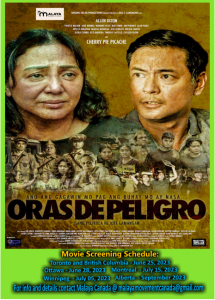Opening a door to the truth
Opening a door to the truth
 ORAS DE PELIGRO: FILM REVIEW
ORAS DE PELIGRO: FILM REVIEW
By Lui Queano
The Philippine Reporter
Oras de Peligro, which prominently featured the historical narrative of the four-day peaceful EDSA revolution, was the result of a collaboration between acclaimed director Joel Lamangan (“The Flor Contemplacion Story”), 1Sambayan celebrities-turned-producers Atty. Howie Calleja and Alvi Siongco, who also played a police officer in the film. The script was written by veteran screenwriters Boni Ilagan and Eric Ramos.
The film opens on the eve of People Power, after President Marcos has been reelected for a second term. Despite widespread allegations of cheating, it is unlikely that the dictator will be deposed anytime soon because he continues to enjoy the support of the Armed Forces and the feared Metropolitan Command (MetroCom) of the Philippine Constabulary.
Dario, portrayed by Allen Dizon (Dukot, Migrante, Twilight Dancers), and Beatriz, portrayed by Cherry Pie Picache (John John, Mano po), are diligently working to pay for the education of their two children. Beatriz urged Dario to prioritize providing for the family over attending rallies and demonstrations. As the plot develops, Dario was murdered by a corrupt Metrocom police officer as he attempted to stop a botched robbery. After Dario was killed, Beatriz and the rest of Dario’s family must deal with a system designed to keep them in check.
The plight of everyday people was the film’s overarching theme. The film’s main premise is that this is an aspect of the past that is frequently forgotten. Beatriz’s family serves as a stand-in for the ordinary people who influenced historical events. The plight of ordinary people in the final days of a dictatorship provides the film’s context, and much of it comes from archival footage.
Without a doubt, Picache’s performance as the grief-stricken Beatriz is the film’s narrative engine and emotional centre. When we find out that her last conversation with Dario was an argument, we feel bad for her, but we also share her resolve to protect her husband’s legacy. When corrupt police officers tried to take the body away from the wake, Beatriz and her family fought back, inspiring the rest of the mourners to join in.
Adding the peasants’ struggle, which has been going on for over a decade, to the Oras de Peligro story makes it more compelling and makes sense. Lamangan was keenly aware of the political context surrounding the dictator’s overthrow: ordinary, struggling farmers took to the streets to voice their grievances, and the only moral response to the tyrannical regime was to join the revolution. Nanding Josef, a veteran of the Philippine stage and screen, played Dario’s father and a peasant leader in the movie.
The workers’ story is brilliantly woven into the plot, without which the film would be little more than a cock-and-bull tale. The script by Boni Ilagan and Eric Ramos helped make the film more believable and authentic in its depiction of the political crisis brought on by low wages and the exploitation of workers by capitalists who are direct puppets of the Marcos regime.
Alvi Siongco’s natural portrayal of Sgt. Ruiz , illustrates how state forces change their allegiance depending on who is in power, while simultaneously forgetting the wrongs they’ve committed against the people. Lamangan’s portrayal of the middle class forces’ willingness to take part in the revolution and join the throng of the masses in defense of freedom and democracy was echoed by the comedic and humorous performance of Mae Paner in the film.
The outstanding performance of Dave Bornea and Therese Malvar as the children of Dario and Beatriz gave a strong voice to the future of the country that the deposed dictator had stolen from them. These orphaned children won’t have much time to grieve or accept that they are the generation destined to pay for the sins of the dictator who left nothing but poverty, injustice, and corrupt bureaucracy.
Those who were too young to experience the Marcos dictatorship firsthand will be grateful to Lamangan,and writers Ilagan, Ramos and the producers for opening a door to the truth.
Even if it’s just to prove to the public how wonderful this film is, the truth deserves to be told for future generations. And yes, celebrity journalist and poet Pablo Tariman is correct in saying, “Oras de Peligro, is the movie of the year!” because of the story, the director, the writers, and the actors who all put their hearts and souls into their performances.
(Oras de Peligro is being distributed by Malaya Canada and is screening in theatres across Canada, including Toronto, British Columbia, Ottawa, Montreal, Winnipeg, and Alberta.)
Comments (0)